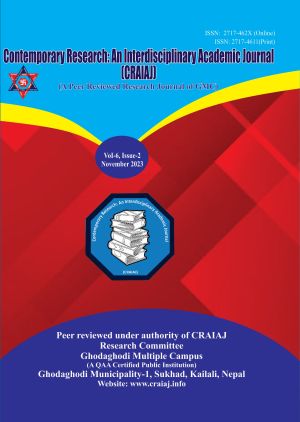The Contribution of Micro-Enterprises in Nepalese Economy
DOI:
https://doi.org/10.3126/craiaj.v6i2.60245Keywords:
Employment, Income, Investment, Kathmandu Nepal, Micro-enterprisesAbstract
Micro-enterprises in Nepal are vital, fueling employment, GDP growth, exports, and more. In this context, this paper aims to deal with investment, income and employment (IIE) analysis of Micro-enterprises in Nepal. Using descriptive statistics and multiple regression model, the study has employed cross-sectional data set collected from enterprises survey in the Ward No.14 of Kathmandu Metropolitan City. In the survey, the sample size was 30 small enterprises including tea stall, sweets, haircutting, meat shops, and vegetables. In the enterprises, high investment that is 80 percent have generated high income level that is multiple times of investment in retail enterprises, except hair cutting, meat shops, boutique, sweets and vegetables. In employment generation, all enterprises have positive implications. Besides, the model shows positive relationship between income, investment and employment. However, it is statistically insignificant because p value is greater than 0.05. However, in real life, this is significant because the main attractive investment fields are hair-cutting and meat shops. It is clear that investment output depends on the presence of such business units in their vicinity. The relationship between income and investment is statistically insignificant (p-value 0.416 > 0.05), and the same is true for income and employment (p-value 0.445 > 0.05). The number of employees and the type of business are closely related (p-value 0.000 to 0.01). Therefore, the micro-enterprises are a prominent economic activity to generate self-employment, income generation and promoting small scale investment. This study result significantly contributes on generic perception of the policy makers on enterprises development statistically to continue enterprises development programs and policy of the government of Nepal and Kathmandu Metropolitan city to boost up local economy as well as national economy. Furthermore, the study result provides a valuable lesson learnt to create doing business environment of micro-enterprises within Kathmandu for building a strong local supply and value chain system rather than prohibition policy.
Downloads
Downloads
Published
How to Cite
Issue
Section
License
Copyright (c) 2023 Ghodaghodi Multiple Campus, CRAIAJ

This work is licensed under a Creative Commons Attribution-NonCommercial-NoDerivatives 4.0 International License.
© Ghodaghodi Multiple Campus, Research Committee, RMC

This work is licensed under a Creative Commons Attribution-NonCommercial-NoDerivatives 4.0 International License. This license enables reusers to copy and distribute the material in any medium or format in unadapted form only, for noncommercial purposes only, and only so long as attribution is given to the creator.




